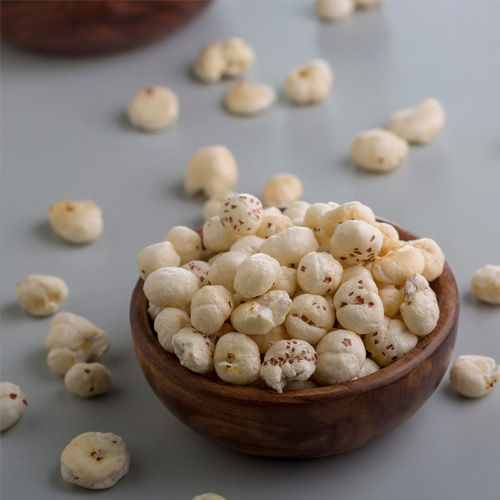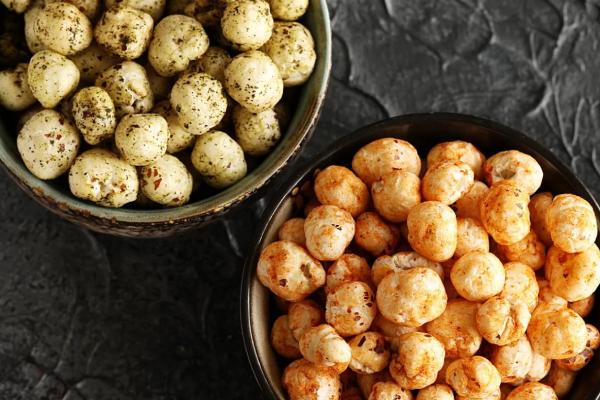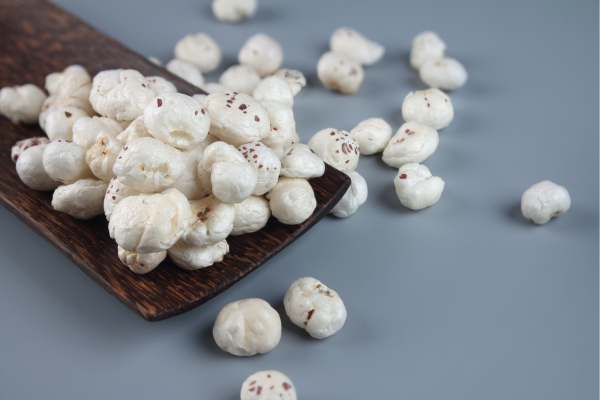
In recent years, makhanas — also known as phool makhanas or fox nuts—have transformed from a traditional Indian snack into a global superfood.
Countries like the UAE, Singapore, Australia, and the UK have witnessed rising demand for roasted and flavored makhanas. Consumers are embracing them for their nutritional richness, while importers see them as a profitable product category with year-round supply from India.
At Cuboid International Exports, we specialize in sourcing, processing, and exporting the finest quality makhanas directly from local farmers in India. Whether you’re a retail brand, a wholesaler, or a food distributor, this article gives you a complete understanding of the product before importing.
What Are Makhanas?
Makhanas are the popped seeds of the Euryale ferox plant, which grows in water bodies, mainly in the Indian state of Bihar. After harvesting, the seeds are dried, roasted, and popped to become the light, crunchy snack that’s now loved worldwide.
India has a monopoly in makhana production, accounting for nearly 90% of the global supply. This gives international buyers a reliable source and competitive pricing compared to any other country.
Why Import Makhanas?
Importing makhanas has become a lucrative opportunity because of three key factors:
1. Global health trends – Consumers are shifting towards low-calorie, high-fiber snacks.
2. Wide product applications – From organic raw makhanas to flavored roasted packs, the product caters to multiple market segments.
3. Long shelf life – Properly packed makhanas remain fresh for up to 9–12 months, making them suitable for long-distance exports.
Nutritional Profile of Makhanas
Experts recommend consuming 25–50 grams of roasted makhana per day as part of a balanced diet. They are rich in protein, fiber, and micronutrients, making them an excellent snack for both health-conscious and general consumers.
Here’s a nutritional breakdown (per 100 grams of raw makhanas):

|
Health Benefits of Makhanas
Makhanas are more than just a crunchy snack — they are a functional food with multiple health benefits.
Weight loss support: Low in calories, high in fiber, and promotes satiety.
Manages blood sugar levels: Slow-release carbohydrates prevent sugar spikes, making them diabetes-friendly.
Supports digestive health: Rich fiber content aids digestion and improves gut function.
Anti-oxidant properties: Contains kaempferol and other compounds that help fight inflammation.
Great for heart health: Low fat and cholesterol-free, suitable for cardiovascular wellness.
Protein-rich: Excellent for vegetarians and vegans as a plant-based protein source.
Suta Sizes in Makhanas
In the makhana trade, grading is crucial. Sizes are categorized from 3 Suta to 6+ Suta, and pricing often depends on the size grade.
Here’s a quick reference table:

Larger sut sizes are often preferred for roasted and flavored makhana packs, while smaller grades are used for bulk supply.

HS Code for Makhana Export
For importers, the HS code for makhana is:
HS Code: 19 04 10 90 — Prepared foods obtained by the swelling or roasting of cereals or cereal products (under which makhanas are classified).
This is essential for customs clearance and duty structure calculation in your country.
Roasted and Flavored Makhanas
While organic raw makhanas remain popular, roasted variants are the fastest-growing product segment in global markets. They are roasted mostly in olive oil or rice bran oil, giving them a healthy edge.
Some trending flavors include:
Salted & Classic
Peri Peri
Cheese
Tomato Chili
Himalayan Pink Salt
Mint & Herbs
Black Pepper
Cream & Onion
At Cuboid International Exports, we also offer custom flavor development as per buyer requirements.

Why Choose Cuboid International Exports?
When you import makhanas through Cuboid International Exports, you get:
Hand-sourced premium makhanas directly from Indian farmers.
Custom packaging & white-labeling solutions to match your brand needs.
Bulk supply in all grades (3 Suta to 6+ Suta).
Roasted and flavored premium variants available.
Strict quality checks ensuring international food safety compliance.
Competitive pricing backed by India’s strong production monopoly.
FAQs for Buyers
1. What is the minimum order quantity (MOQ) for importing makhanas?
At Cuboid International, we usually cater to wholesale and bulk buyers with flexible MOQ options starting from one container load, depending on destination and product type.
2. Are makhanas certified for international food safety standards?
Yes, we provide FSSAI, APEDA, and export-quality certifications. For specific markets, we can arrange HACCP, Halal, or Organic certifications as required.
3. Can I get customized packaging for retail sale?
Absolutely. We offer private-label and white-label solutions, including jars, pouches, and vacuum-sealed packs.
4. What shelf life do makhanas have during shipping?
Properly packed roasted makhanas last 9–12 months, while raw makhanas can last longer under cool, dry storage.
5. Which countries import the most makhanas from India?
The UAE, UK, USA, Singapore, Australia, and Japan are currently among the top importers. Demand is also rising in Europe due to growing health snack trends.
Final Thoughts
The global demand for organic, roasted, and flavored makhanas is only increasing, making them a high-potential product for international importers.
With their nutritional richness, versatile applications, and strong consumer appeal, makhanas are positioned as the super snack of the future.
At Cuboid International Exports, we are proud to deliver the finest quality makhanas—sourced ethically, processed hygienically, and customized to your exact requirements.
Whether you’re importing in bulk or looking for branded retail packs, we ensure your business taps into this booming market with confidence.



